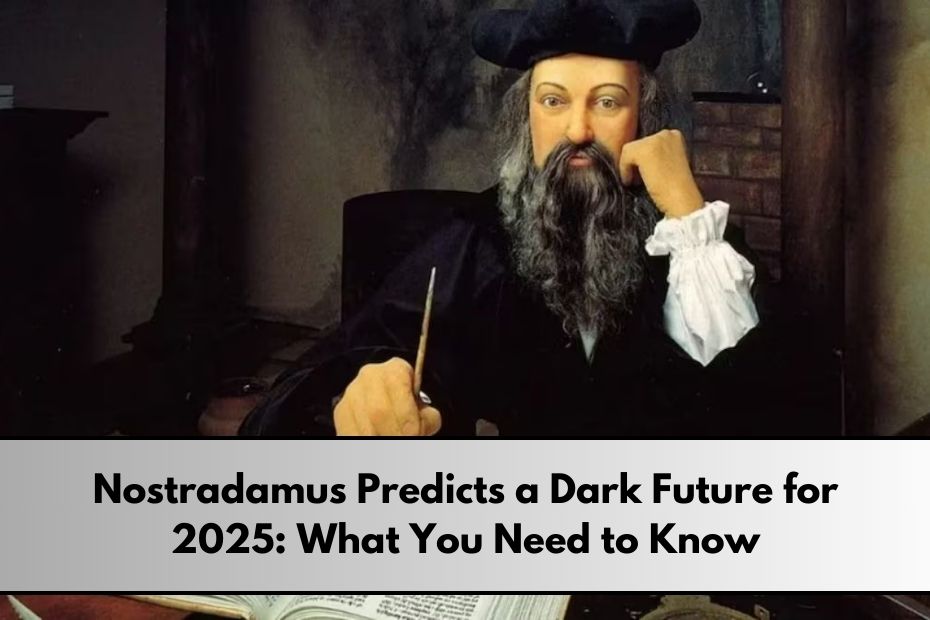Have you ever wondered if our future is already written? Could the choices we make and the challenges we face be pre-determined? These questions have sparked interest for centuries, especially when looking at the mysterious predictions of Nostradamus. His prophecies have fascinated people for hundreds of years, with many believing his cryptic verses predict everything from natural disasters to political upheavals. As we approach 2025, his predictions seem more relevant than ever. In this article, we will explore some of Nostradamus’s most chilling prophecies for 2025 and what they might mean for the world.
Who Was Nostradamus?
Michel de Nostradamus, born in 1503 in France, was a physician, astrologer, and prophet. While he gained fame for his medical work during Europe’s plagues, it’s his cryptic quatrains (four-line verses) that have cemented his place in history. These prophecies, written in the 16th century, have been interpreted by many as predicting significant events, including the French Revolution, the Bubonic plague, and even the bombing of Hiroshima in 1945. His predictions are often mysterious and open to interpretation, leading to debates on whether he had supernatural insight or simply a vivid imagination.
Nostradamus’s Predictions for 2025
As we look ahead to 2025, Nostradamus’s verses seem to offer a glimpse into a turbulent future. Let’s explore some of his most haunting predictions:
Natural Disasters: The Ring of Fire Erupts
Nostradamus foretold that the “Earth will shake around the new city, two great rocks will fire for a long time, and the sky will catch fire over the ocean.” This may point to a massive volcanic eruption in the Pacific Ring of Fire, an area known for its frequent volcanic activity. With active volcanoes in regions like the Philippines, Japan, and the US, scientists warn of potential supervolcanic eruptions that could cause widespread devastation.
Political Upheaval: The Fall of Great Empires
Another prophecy mentions that “the great Empire will be replaced by another,” possibly predicting the rise of new powers and the decline of current superpowers. Could this be a warning about shifting political alliances, with nations like China and India emerging as global leaders while Western powers face internal struggles? Nostradamus’s words seem to echo the current geopolitical landscape, where political tensions are escalating.
Technological Revolution: The Rise of Artificial Intelligence
Nostradamus’s vision of “the new sage with a lone brain” could symbolize the rise of artificial intelligence (AI). In 2025, AI is expected to have a profound impact on industries such as healthcare, education, and even warfare. While these advancements offer great potential, they also raise ethical concerns about unemployment, privacy, and the potential misuse of AI in military applications.
Environmental Crisis: A Looming Disaster
Nostradamus also warned of environmental catastrophes. His verse about rivers weeping and fields withering might be a metaphor for the global climate crisis. With rising temperatures, natural disasters, and resource shortages, the world could face severe environmental challenges in the coming years. These changes may lead to widespread hunger, displacement, and economic instability, as warned by Nostradamus.
Geopolitical Tensions: A New World Order?
As the East rises and the West falters, Nostradamus’s predictions of a “new order forged in the forge of the dragon” could reflect the growing power of nations like China. With its rapid economic and technological advancements, China’s influence on global politics may continue to grow, challenging the traditional dominance of Western powers.
Conclusion
Nostradamus’s predictions for 2025 are filled with alarming warnings about natural disasters, political instability, and technological advancements. Whether you believe in the accuracy of his prophecies or not, they serve as a reminder of the uncertain future ahead. As we approach 2025, it’s important to consider how we, as a global community, can prepare for the challenges that lie ahead. Are we ready to face the future, or are we simply following a path that has already been written?

